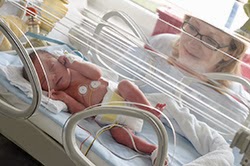 Alongside growing global diagnoses of depression, post-traumatic stress disorder (PTSD) is on the rise, affecting around 10% of women over their lifetime and, significantly, most prevalent among women of childbearing age. Together with those who begin pregnancy already suffering from the condition is the 1-7% of women who develop PTSD after giving birth. It’s clear there’s an issue that needs addressing.
Alongside growing global diagnoses of depression, post-traumatic stress disorder (PTSD) is on the rise, affecting around 10% of women over their lifetime and, significantly, most prevalent among women of childbearing age. Together with those who begin pregnancy already suffering from the condition is the 1-7% of women who develop PTSD after giving birth. It’s clear there’s an issue that needs addressing.
Diagnosis of PTSD and links with depression
PTSD is characterized by distressing memories of a traumatic event, nightmares, flashbacks, anxiety, insomnia, irritability, and anger. The condition is distinct from acute stress disorder in the length of time PTSD symptoms can last: from more than a month to years.
The correlation between PTSD and depression has been well documented. People who’ve had a diagnosis of PTSD are 48% more likely to experience depression and, according to the American Psychiatric Association, people with PTSD are also 80% more likely to meet criteria for another mental health disorder than people without the condition.
How PTSD affects pregnancy
A recent study found that women who have PTSD while pregnant may be at risk from preterm birth, particularly if they also suffer from depression.
The study, led by Dr. Kimberly Ann Yonkers from the Yale University School of Medicine, focused on whether the preterm births associated with PTSD were a result of the condition or the medication used to treat it. It was found that women taking benzodiazepine appeared to be twice as likely to have a preterm birth, while the risk for women taking SSRI antidepressants (the most commonly prescribed antidepressants) was 1.5 times higher.
However, even when taking into account the apparent effects of medication, researchers found that women with PTSD and depression were four times more likely to give birth early.
“These really should be considered high-risk pregnancies,’’ Dr. Yonkers said.
Treatment for PTSD during pregnancy
 Treatments for PTSD include psychotherapy and antidepressants (usually SSRIs). However, in the UK, standard advice from the NHS is that SSRIs are not recommended during pregnancy due to possible risks to the baby. In the US, the FDA similarly warns women of potential dangers.
Treatments for PTSD include psychotherapy and antidepressants (usually SSRIs). However, in the UK, standard advice from the NHS is that SSRIs are not recommended during pregnancy due to possible risks to the baby. In the US, the FDA similarly warns women of potential dangers.
There is some evidence to back this up. Studies have shown that boys with autism are nearly three times more likely to have been exposed to SSRIs before birth. Similarly, links have been made between a mother’s use of antidepressants and a child’s chances of developing attention deficit hyperactivity disorder (ADHD).
But the mother’s own condition, rather than the treatment, could be the decisive factor according to the Yale researchers.
Change is needed
What the study reveals is that pregnant women with untreated PTSD also risk giving birth prematurely. While this, like many studies, focuses on possible risks to the baby, PTSD is a serious, debilitating condition and one for which women require treatment. The lack of clarity around the safety of relevant medications – both for the woman and for her child – urgently needs addressing.
If rates of PTSD continue to rise, especially in conjunction with depression, it is vital that women have access to the right information about their medication and can weigh up the risks to their child with their own wellbeing. It’s also important to encourage the development of new treatments that take into account the safety of the unborn child.
